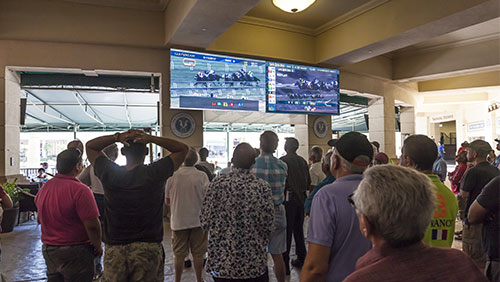Point of consumption taxation versus the mobile market
“ It is always darkest under the lamp.”“
Rudyard Kipling, KIM
Market Arbitrage
 Long before the Internet, multinational companies practiced arbitrage. How does that work? On basic business principles—buy low and sell high. The trick with arbitrage is that you don’t buy and sell in the same place, or at least at the same time.
Long before the Internet, multinational companies practiced arbitrage. How does that work? On basic business principles—buy low and sell high. The trick with arbitrage is that you don’t buy and sell in the same place, or at least at the same time.
Suppose lettuce is selling for 50 cents per head (I know it’s more than that in real life, just follow along). As I said, it sells for 50 cents in the fictitious state of Zenith, while at the same time it sells for a buck and a half in the equally imaginary state of Excelsior. For a lettuce broker, obviously the thing to do is buy in Zenith and sell in Excelsior. Kind of basic.
And businesses, particularly multinationals, use the same system to keep their tax bills down. Our lettuce broker can set up a corporation in Zenith, and another in Excelsior. Wherever the taxes are lowest, that’s where he declares the profit. And he seeks to credit as much of his expenses and overhead as he can to the high tax jurisdiction as deductions.
This is called transfer pricing, and the authorities of every nation decry the practice (except when they use it themselves). Needless to say, they especially hate transfer pricing when it comes to high-volume, high-value transactions. Like gambling.
Before the Internet came, transfer pricing as far as gambling was scarcely possible. In order to gamble, the players, the house, and the money all had to be in the same place at the same time. Which made them easy to track and regulate.
Came the digital revolution and everything changed. Today, it is possible to organize a poker game online, with players from Australia, Alberta, Argentina and Angola-jurisdictions that are nowhere near each other. And the server controlling the game may be in Antigua, i.e. nowhere near any of them. Why should this be a problem—consenting adults and all that? Because until some kind of jurisdiction is established, no one can figure out who gets to tax the operators and the players. And the global market for sports betting, including online sports betting, is something like $350 billion per year. So the right to tax even a little bit of that torrent is something governments want very much. Even unto stretching a legal point, here and there.
As we have seen before, determining jurisdiction over the Internet is very problematic, especially for sensitive areas such as gaming. To this day, most countries haven’t really come to grips with it. We have English common law, the basis of our legal system. That tells us that when the location of a contract isn’t specified, it’s deemed to take place where it can actually be executed. For purposes of online gaming, that’s the server of the operator offering the gambling. The UK, in its revised Gambling Act of 2005, made that into firm law—for the British, anyway.
But there was still a problem: operators displayed a marked preference for locating in low tax jurisdictions, which definitely does not include Great Britain. What to do? British authorities came up with Point of Consumption (POC) taxation. The taxable event is not the reception of the gambling information by the operators server; rather, now it is located with the customers themselves when they place the bet.
But what about mobile gambling? What if John Punter is on vacation in Spain, let’s say, when he places a bet? The taxman saw that coming; for tax purposes, the locus of the bettor is always his registered address, wherever he may physically be. And it seems to work. Australia is moving to enact POC betting taxes of its own, one state at a time. Will this be the wave of the future?
Probably not. POC works best where the borders are easily defined—Britain and Australia are both islands. Elsewhere it may not be that easy. In New Jersey, for example, when Internet poker was introduced, a number of Jersey residents found they could not sign on. They resided too close to state lines. And the Jersey authorities were particularly worried about unauthorized gambling “spilling over” into jurisdictions that didn’t allow it.
To allow that, even by omission, was to risk a fight over jurisdiction with neighboring states. And as we have seen, no one is eager to tackle the Internet jurisdiction question. So in the U.S., at least, existing regimes for gambling taxation will probably not be changed, even if sports betting becomes general.
Regulatory Arbitrage
And there is another angle, another consideration for operating and marketing gambling that was not there, pre-Internet. Individual people can now practice regulatory arbitrage, as well as market arbitrage. What do we mean by that?
Before the Internet, to regularly interact with parties overseas usually took the administrative resources of at least a small corporation. But when everything went digital, global, and online, individual people found that they could not only pick and choose pricing, as with our lettuce broker, but even which set of rules and regulations they want to follow. Businesses and corporations do it every day: “this contract shall be construed and enforced under the laws of (wherever)”. But governments don’t mind that; businesses are relatively easy to control.
It’s something else again when individual people start making those choices, on an individual basis, i.e. broad-based regulatory arbitrage. Little Augie wants to look at the Miss July foldout, but no place in town will sell him a copy of Playboy? There are sites on the Internet whose home authorities don’t object in the least to broadcasting pictures of nekkid women. Does Mr. Xiong live under a government that doesn’t want to discuss democracy? He can go on the Internet and access the site from a country where such things are not forbidden. And if Joe Average wants to bet on the Super Bowl, but there’s no place in his state that allows it, and he can’t afford a ticket to Vegas… the Internet strikes again.
Arbitrage for Governments?
So it’s easy to see why governments have doubts and reservations about the Internet (though most of them don’t really show it). Things get really interesting, however, when the governments themselves decide to use this arbitrage-via-Internet technique.
The best examples are the small Caribbean republics like Antigua, Turks and Caicos, or Costa Rica. Years ago, they found that their sovereignty was one of their few marketable resources. By the time Internet betting became technically feasible, around 1995, these small nations were already experienced in attracting investment and operations from high tax, high regulation jurisdictions like the U.S. or the UK.
Their main attractiveness lay in what had already pulled in the trusts and private bank accounts: tight secrecy laws, loose supervision, and, most of all, money that was looking for a more hospitable environment.
And so these little republics enjoyed a long spell of profitable exclusiveness, as far as online gambling of all sorts was concerned.
What has been lost sight of, however, is that attractiveness is relative. When conditions affecting business decisions change, so does the relative attractiveness of some jurisdictions, and the relative unpopularity of others.
And now there is a shift in U.S. gambling law that may very well increase the attractiveness of basing a gaming business—especially sports betting—in America.
New Paradigm for Sports Betting?
 Everybody knows that the U.S., especially at state government level, is down on gambling, restricting what it can’t ban outright. And everybody knows that ex-colonies like the Caribbean nations, Malta, Gibraltar, and so on, are the best place to set up gambling operations because their taxes are so low. Or that’s how it used to be.
Everybody knows that the U.S., especially at state government level, is down on gambling, restricting what it can’t ban outright. And everybody knows that ex-colonies like the Caribbean nations, Malta, Gibraltar, and so on, are the best place to set up gambling operations because their taxes are so low. Or that’s how it used to be.
But the old rules are changing. Since the U.S. Supreme Court struck down PASPA, U.S. state governments have been at liberty to license sports betting within their respective borders. And many are eyeing the potential revenue this represents.
And since the UK initiated its point of consumption tax program, the advantages of locating offshore while servicing the UK market have become much less.
Does this represent an opportunity for U.S. state governments? All of a sudden, it begins to look like U.S. states may be some of the lowest tax jurisdictions regarding gambling.
Add to this the fact that many U.S. states simply don’t have a big enough population to support viable gambling markets long-term.
Remember, too, that the Internet has unparalleled power to reach new markets and new customers. Whatever the future of gambling is, it’s pretty much guaranteed to be digital and online.
And now we begin to see the outlines of the opportunity. Millions of bettors in the UK and Europe looking for less taxed and less expensive ways to bet, and U.S. states need more customers.
For while U.S. state governments have a “gentlemen’s agreement” that they are not to poach on each other’s clientele, no such restriction applies to allowing bettors from abroad to participate in a gambling market licensed by a U.S. state.
True, many U.S. state gambling laws forbid nonresidents from participating in state licensed gambling—in fact, many insist that the gambler be physically located within the state borders to make a bet at all.
But has anyone looked into the possibilities of agency? Subscription services to allow legal betting on behalf of these outsiders? Would American Indians, operating under the Indian Gaming Regulatory Act, be allowed to get into the act?
We don’t know the answers to any of that. In fact, we’re still in the process of formulating useful questions. Only one thing is entirely clear right now: the new legal situation regarding sports betting, especially via online means, has opened a door to new possibilities, even for businesses regulated by U.S. state laws.
It remains to be seen how big that door can be, or how many jurisdictions will choose to walk through it.
Mr. Owens is a California attorney specializing in the law of Internet and interactive gaming since 1998. Co-author of INTERNET GAMING LAW with Professor Nelson Rose, (Mary Ann Liebert Publishers, 2nd ed 2009); Associate Editor, Gaming Law Review & Economics; Contributing Editor, TSN. Comments/inquiries welcome at [email protected].





